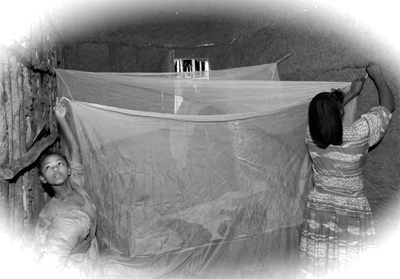
Malaria prevention and control measures resulted in 25% less deaths in the past decade, 33% in Africa. Funding though may not be available for such programs as before when the expansion delivered the reduction in death/infection. The World Malaria Report by the UN World Health Organization (WHO) attributes the success to the widespread use of bed nets, better diagnostics and greater availability of effective drugs.
Funding Shortfalls?
WHO warned though that a projected shortfall in funding for the global anti-malaria campaign threatens the gains, stressing that that the double challenge of emerging resistance to drugs and insecticide needs to be addressed. “The future depends heavily on assuring the resources that we need to carry on the fight, and on looking for ways to improve our efficiency. One of those ways would be to develop longer-lasting insecticide-treated nets that can protect people for as much as five years and might cut our need for insecticide-treated nets between now and 2020 from 1.25 billion to 750 million nets, saving us $3.8 billion over that time period,” according to Robert Newman, the Director of WHO’s Global Malaria Program. (Link to World Malaria Report -
apps.who.int/bookorders/WHP/detart1.jsp?sesslan=1&codlan=1&codcol=15&codcch=4740#)
Efficiency in Combating Malaria:
“With malaria deaths in Africa having fallen significantly since 2000, the return on our investment to end malaria deaths has been greater than any I have experienced in the business world. But one child still dies every minute from malaria – and that is one child and one minute too many. The toll taken by the current economic crisis must not result in our gains being reversed, or progress slowed,” according to Raymond Chambers, the Secretary General’s Special Envoy for Malaria.
Long-lasting insecticidal nets have been one of the least expensive and most effective tools in the fight against malaria. According to the report, the number of bed nets delivered to malaria-endemic countries in sub-Saharan Africa increased from 88.5 million in 2009 to 145 million last year. Approximately 50% of households in sub-Saharan Africa now have at least one bed net, and some 96 per cent of persons with access to a net use it. See Film Report: - “World Malaria Day-Mandy Moore” -
diplomaticallyincorrect.org/films/movie/world-malaria-day-mandy-moore/26461.
Old Sources Reducing – Finding Fresh Sources?
International funds for malaria control reached $1.7 billion in 2010 and $2 billion in 2011, but remained significantly below the $5 billion to $6 billion that would be needed annually to achieve global malaria targets. According to projections in the report, despite increased support from the United Kingdom, malaria funding will slightly decrease in 2012 and 2013, and will likely drop further to an annual $ 1.5 billion by 2015.“Unless we maintain our commitment to scale up the proven cost-effective tools – we have to prevent, diagnose and treat malaria – today’s gains will be reversed and we will lose many more lives to this disease,” according to Awa Marie Coll-Seck, the Executive Director of the Roll Back Malaria Partnership. “The road ahead will be challenging. We have a real problem of financing… We must urgently work together to find creative solutions to maximize the impact of available funding and secure new resources.”
---By, Susan Sacirbey
Facebook: Become a Fan at “DIPLOMATICALLY INCORRECT” & “SUSAN SACIRBEY”
Follow on TWITTER @DiplomaticallyX
“Humanitarian” Channel -
diplomaticallyincorrect.org/c/humanitarian

